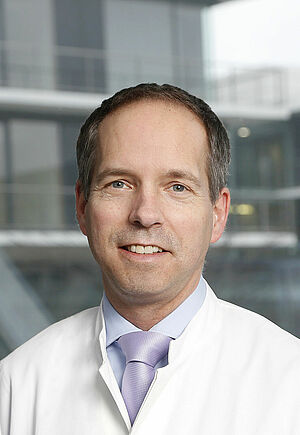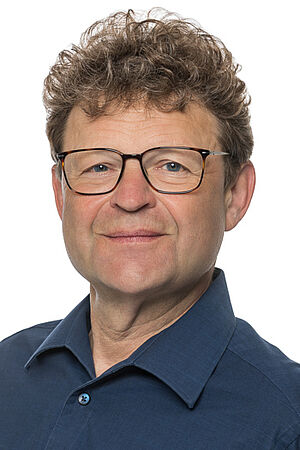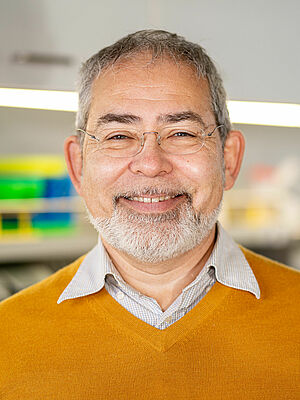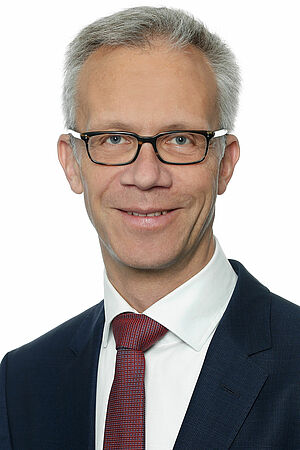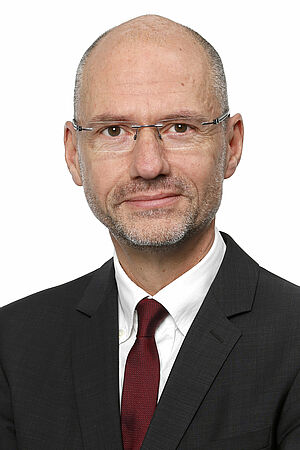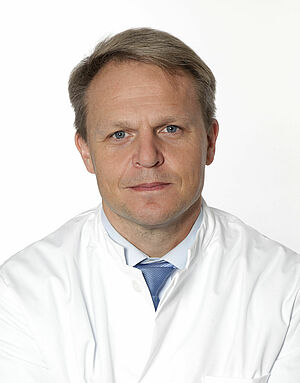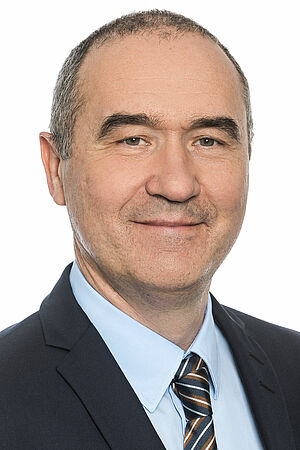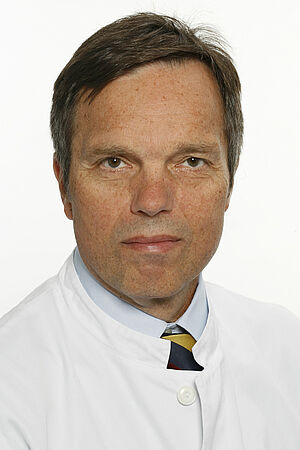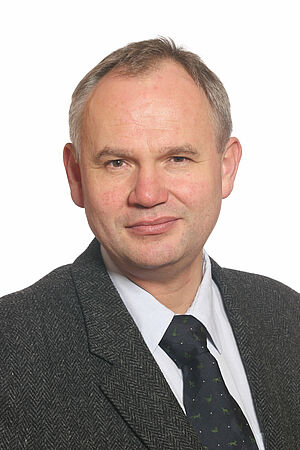Member institutions and representatives
14 departments and institutes at the University Hospital Düsseldorf have a cardiovascular research focus. They are thus integral parts of the Cardiovascular Research Institute Düsseldorf and essential for the cardiovascular research field of the HHU’s Medical Faculty.
All member institutions as well as their representatives are presented here in detail.
Speaker CARID
Deputy Speaker CARID
Institute of Diagnostic and Interventional Radiology
The Institute of Diagnostic and Interventional Radiology is committed to the scientific and clinical care of patients with cardiovascular diseases. Diagnostics and therapy are two essential pillars of research, teaching and patient care. Clinical and preclinical imaging are available at our institute.
Institute of Cardiovascular Physiology
The Institute of Cardiovascular Physiology investigates the functional relationships that lead to the development of cardiac dysfunctions. One of our main topics is the molecular analysis of protective mechanisms of the IGF1- AKT signalling pathway for the modulation of cardiac metabolism and the sterile inflammation of the heart after acute myocardial infarction. We were able to show that IGF1 modulates cardiac metabolism after myocardial infarction and shifts cells of the innate immune system from a pro- to an anti-inflammatory phenotype within the onset of sterile inflammation. We address our questions by investigating myocardial infarction's functional, structural, and molecular consequences for the heart of transgenic mouse models under both normal nutrition and hyperglycemia/diabetes mellitus as significant comorbidities. Furthermore, we investigate the importance of cardiac p38 MAP kinase in the development of dilated cardiomyopathy and cardiac insulin resistance as well as the development of cardiac atrophy upon loss of AKT signal transduction in cardiomyocytes.
With respect to teaching, we educate students of medicine, dentistry, pharmacy, and medical physics in the subject of physiology.
Institute of Molecular Cardiology
The institute focuses on investigating the interplay of function, energetics, metabolism, and inflammation in the development of cardiovascular diseases using innovative multinuclear magnetic resonance (MR) techniques. Since the use of transgenic mouse lines offers a variety of possibilities regarding targeting these fundamental questions, their use has steadily increased over the last two decades. In order to be able to characterise the phenotype of the mutants as completely and non-invasively as possible, we have established an extensive arsenal of spectroscopic and imaging magnetic resonance techniques (MRS/MRI) over the last 25 years. Building on this, we plan to bring together the non-invasive methods we have established to determine tissue texture, energetics, metabolism, and inflammation in the future. Current research work shows that (i) inflammatory diseases are accompanied by great changes in the intermediary metabolism and (ii) that the healing process can be modulated by specific changes in this. Accordingly, imaging techniques will be (further) evolved to visualise the resulting interactions in an experimental setup and to study them in vivo.
Institute of Molecular Medicine III
Our focus is on sphingolipids and their metabolism, which controls fundamental cell life processes. As a special class of "bioactive lipids," their metabolites play essential roles in normal physiology but also in the pathogenesis of diseases. Dysregulation of the sphingolipid balance, the so-called "sphingolipid rheostat," is involved in developing cardiovascular, metabolic, inflammatory, and immunological diseases. Defects in sphingolipid metabolism occur during and contribute causally to diseases such as myocardial infarction, atherosclerosis, diabetes, fatty liver, obesity, and osteoporosis. They also play an important role in physiological processes such as ageing. As scientists and physicians, we strive for translational transfer of our research into clinical therapy. Drugs based on one of the many bioactive lipids, sphingosine-1-phosphate, have recently been used in treating multiple sclerosis (Gilenya®, Mayzent®) and are in clinical trials for treating autoimmune diseases and cancer.
Institute of Neural und Sensory Physiology
The Institute of Neural and Sensory Physiology’s area of responsibility is teaching and researching the functions and diseases of the nervous system, including the brain, the spinal cord, the sensory organs, and the peripheral nerves. The Institute conducts brain research from the molecule to the individual cells, their organisation in networks and systems, to the essence of the human being. The key to understanding this is the interaction of nerve cells via synapses. With the help of a broad spectrum of methods, the Institute contributes crucially to understanding diseases of the nervous system.
Institute of Pharmacology
The Institute for Pharmacology is engaged in research and service tasks in all areas related to the effects of drugs. In the molecular pharmacological area, these tasks include the clarification of effect mechanisms and, in some instances, the further development of medications.
Institute of Translational Pharmacology
The Institute of Translational Pharmacology combines current research results from basic research with the clinical situation of patients. Thus, the main focus of our research is to gain knowledge from studying cells or animal models in the laboratory and to transfer this to the patient. In doing so, we are in close exchange with the Clinic for Cardiology, Pulmonary Diseases and Vascular Medicine, the Clinic for Vascular and Endovascular Surgery, and the Clinic for Nephrology.
Department of Anaesthesiology
With 130 medical and non-medical staff members, the Department of Anaesthesiology is one of the largest specialist departments at Düsseldorf University Hospital. Its tasks include anaesthesiology, operative intensive care medicine, pain therapy, and emergency medicine.
Preoperatively, the Department of Anaesthesiology is responsible for a thorough physical examination of the patient, the evaluation of all clinical findings and thus also the risk assessment and the selection of the appropriate anaesthetic procedure. The reduction of anaesthesia fears and medication preparation for the procedure are part of the tasks of preoperative patient care, too.
Department of Vascular and Endovascular Surgery
The clinical focus of the Department of Vascular and Endovascular Surgery includes kidney transplantation, minimally invasive and classic vascular surgery operations. The clinic is particularly specialised in constrictions of the carotid arteries, dilatations of the aorta, circulatory disorders in the area of the pelvic and leg vessels, the creation of AV shunts for dialysis patients, and the therapy of varicose veins.
The Department of Vascular and Endovascular Surgery is also home to the "Aortic Lesions" work group headed by Dr. Wagenhäuser.
Department of Cardiac Surgery
The internationally renowned Department of Cardiac Surgery at the University Hospital Düsseldorf stands in the light of a long and successful history. Since 1938, more than 50,000 heart operations have been performed here. Pioneering achievements include the first open-heart surgery with surface hypothermia, the first implantation of a pacemaker as well as a cardioverter defibrillator system in Germany.
Department of Cardiology, Pulmonary Diseases and Vascular Medicine
Outstanding science, teaching through interprofessional cooperation, and, of course, excellent patient care are the hallmarks of the Department of Cardiology, Pulmonary Diseases and Vascular Medicine headed by Prof. Dr. Malte Kelm at the University Hospital Düsseldorf. Nationally and internationally, the department is known as a certified training and education centre. Its management team consists of six senior physicians who, in turn, preside over six closely interrelated cardiovascular departments, thus treating the entire spectrum of diseases in cardiovascular medicine. The departments include the Department of Coronary Vascular Cardiology and Conservative Intensive Care Medicine, the Department of Heart Failure, Emergency and Rescue Medicine, the Department of Structural Heart Disease and Congenital Heart Defects, the Departments of Interventional Rhythmology and Device Therapy, as well as the Department of Diagnostic and Interventional Angiology, and the Department of Pneumology.
Department of Nephrology
The Department of Nephrology treats all acute and chronic kidney and systemic diseases with kidney involvement. Its focus is on planning and preparing for a kidney transplant and its follow-up after successful kidney transplantation. The Department of Nephrology is a European Centre of Excellence for Hypertension and has remarkable experience in diagnosing and treating primary, secondary, and difficult-to-control arterial hypertension.
Central Institute of Clinical Chemistry and Laboratory Diagnostics
The Central Institute of Clinical Chemistry and Laboratory Diagnostics covers the entire field of clinical chemistry, haematology, and haemostaseology, particularly acute and emergency diagnostics, as well as diagnostics of liver, kidney, and cardiovascular diseases. Furthermore, the routine focal points include haemostaseology, clinical toxicology and trace element analysis, therapeutic drug monitoring, disorders of bone metabolism, and tumour markers.
The research foci of the Central Institute of Clinical Chemistry and Laboratory Diagnostics include beta-adrenergic signal transduction, chromatin structure and cell nuclear architecture, and cell cycle control.





